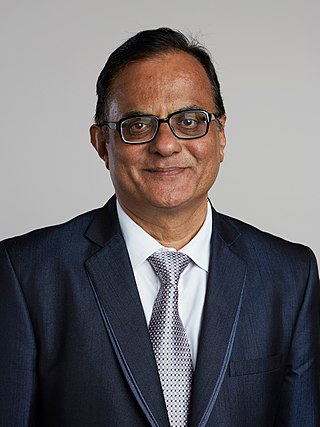This article needs to be updated.(April 2021) |
| Type | Research Institution |
|---|---|
| Location | , , |
Indian Institute of Nano Science & Technology (IINSc) is a research institution that teaches nano science and technology. It is located in Bangalore, India.
This article needs to be updated.(April 2021) |
| Type | Research Institution |
|---|---|
| Location | , , |
Indian Institute of Nano Science & Technology (IINSc) is a research institution that teaches nano science and technology. It is located in Bangalore, India.
Karnataka is home to many such initiatives..and for Indian Institute of Nano Science & Technology to support and develop nanotechnology and reap the benefit of technology. Nanotechnology in India has started to noticed and high potential, develop and get importance in both research and commercial value. [1]
In Karnataka research centres like Jawaharlal Nehru Centre for Advanced Scientific Research Centre, Indian Institute of Science and the National Centre for Biological Sciences are main research institutes which support the nano park initiative. [2]
The focus of the Indian Institute of Nano Science & Technology will be research and development of nano materials. [3]
Nano Park is the first of its kind in India and supports the development of medical devices, diagnostic kits and pharmaceuticals. [4]
Karnataka state government initiated to set Nano Park in Bangalore with estimated budget allocation of Rs. 150 Crores . The park spreads 25 acres of land and building at Tumakur Road Bangalore. The Park will be on similar lines of an Information Technology Park.
The infrastructure would include a science and technology business incubator which will nurture early stage entrepreneurial ventures based on nano science and technology. There will be laboratories and clean rooms that will prove conducive for nano research.

B.M.S. College of Engineering or Bhusanayana Mukundadas Sreenivasaiah College of Engineering (BMSCE) is a private engineering college in Basavanagudi, Bangalore, India. It was started in 1946 by Bhusanayana Mukundadas Sreenivasaiah and is run by the B.M.S. Educational Trust. It is affiliated with Visvesvaraya Technological University and became autonomous in 2008. BMSCE is located on Bull Temple Road, Basavanagudi, diagonally opposite to the famous Bull Temple. Though a private college, it is partially funded by the Government of Karnataka.

Nanotechnology education involves a multidisciplinary natural science education with courses such as physics, chemistry, mathematics, and molecular biology. It is being offered by many universities around the world. The first program involving nanotechnology was offered by the University of Toronto's Engineering Science program, where nanotechnology could be taken as an option.
The National Nanotechnology Initiative (NNI) is a research and development initiative which provides a framework to coordinate nanoscale research and resources among United States federal government agencies and departments.

Pulickel Madhava Panicker Ajayan, known as P. M. Ajayan, is the Benjamin M. and Mary Greenwood Anderson Professor in Engineering at Rice University, Houston. He is the founding chair of Rice University's Materials Science and NanoEngineering department and also holds joint appointments with the Department of Chemistry and Department of Chemical and Biomolecular Engineering. Prior to joining Rice, he was the Henry Burlage Professor of Material Sciences and Engineering and the director of the NYSTAR interconnect focus center at Rensselaer Polytechnic Institute until 2007. Known for his pioneering work of designing and carrying out the first experiments to make nanotubes intentionally.

Chintamani Nagesa Ramachandra Rao,, is an Indian chemist who has worked mainly in solid-state and structural chemistry. He has honorary doctorates from 86 universities from around the world and has authored around 1,800 research publications and 58 books. He is described as a scientist who had won all possible awards in his field except the Nobel Prize.

Ramaiah Institute of Technology (RIT), formerly known as M.S. Ramaiah Institute of Technology (MSRIT), is a private engineering college located in Bengaluru in the Indian state of Karnataka. Established in 1962, the college is affiliated to Visvesvaraya Technological University.

Kiran Mazumdar-Shaw is an Indian billionaire entrepreneur. She is the executive chairperson and founder of Biocon Limited and Biocon Biologics Limited, a biotechnology company based in Bangalore, India and the former chairperson of Indian Institute of Management, Bangalore. In 2014, she was awarded the Othmer Gold Medal for outstanding contributions to the progress of science and chemistry. She was on the Financial Times 2011 top 50 women in business list. In 2019, she was listed as the 68th most powerful woman in the world by Forbes. She was named EY World Entrepreneur Of The Year 2020. She was married to John Shaw.

Bangalore or Bengaluru, the capital city of the South Indian state of Karnataka, India. The economy of Bengaluru contributes over 43.65% to the economy of the State of Karnataka, accounting for 98% of the Software Exports of the State.
The history of nanotechnology traces the development of the concepts and experimental work falling under the broad category of nanotechnology. Although nanotechnology is a relatively recent development in scientific research, the development of its central concepts happened over a longer period of time. The emergence of nanotechnology in the 1980s was caused by the convergence of experimental advances such as the invention of the scanning tunneling microscope in 1981 and the discovery of fullerenes in 1985, with the elucidation and popularization of a conceptual framework for the goals of nanotechnology beginning with the 1986 publication of the book Engines of Creation. The field was subject to growing public awareness and controversy in the early 2000s, with prominent debates about both its potential implications as well as the feasibility of the applications envisioned by advocates of molecular nanotechnology, and with governments moving to promote and fund research into nanotechnology. The early 2000s also saw the beginnings of commercial applications of nanotechnology, although these were limited to bulk applications of nanomaterials rather than the transformative applications envisioned by the field.

Senapathy “Kris” Gopalakrishnan is an Indian businessman and the chairman of Axilor Ventures, a startup accelerator. He is one of the co-founders of Infosys, having served as its CEO and managing director from 2007 to 2011 and vice chairman from 2011 to 2014.

The Department of Science and Technology (DST) is a department within the Ministry of Science and Technology in India. It was established in May 1971 to promote new areas of science and technology and to play the role of a nodal department for organising, coordinating and promoting scientific and technological activities in the country. It gives funds to various approved scientific projects in India. It also supports various researchers in India to attend conferences abroad and to go for experimental works.

The Institute of Nano Science and Technology (INST) is an autonomous research institution of Department of Science and Technology (India), under the Society Registration Act, 1960, under the umbrella of national mission on Nano Science and Technology (NANO MISSION)", which aims to promote growth and outreach of nanoscience and technology for the benefit of country. INST has been set up to undertake research and generate products/devices and technology in the area of Nanoscience and Technology. The institute aims to carry out research in the diverse and rapidly growing areas of nanoscience and technology with specific emphasis on the following areas: Agricultural Nanotechnology, Nanomedicine, Energy and Environmental Science, Quantum Materials and Device Physics, Nano Electronics, Microfluidics Based Technologies, Nanobiotechnology

Mothakapalli Venkatappa Rajeev Gowda is an Indian politician and academician. He is a former member of parliament in the Rajya Sabha and a national spokesperson for the Indian National Congress. He also currently serves as Chairman of the "Congress Research Department". He was Professor of Economics and Social Sciences and the Chairperson of the Centre for Public Policy at the Indian Institute of Management, Bangalore and taught a range of courses. He served as the Director of the Central Board, Reserve Bank of India. He is currently the Advisor for Bridge India, a progressive non-profit think tank set up in London in 2018.
V Ramgopal Rao is an Indian Academic serving as the Vice Chancellor of Birla Institute of Technology and Science, Pilani from February 2023 onwards. He was previously the director of IIT, Delhi for six years during 2016-2021.

Ajay Kumar Sood is an Indian physicist and researcher currently serving as the 4th Principal Scientific Adviser to the Government of India.

Bengaluru, formerly called Bangalore in English, is the capital and largest city of the southern Indian state of Karnataka. It has a population of more than 8 million and a metropolitan population of around 15 million, making it India's third most populous city and fourth most populous urban agglomeration. It is the most populous city and largest urban agglomeration in South India, and is the 27th largest city in the world. Located on the Deccan Plateau, at a height of over 900 m (3,000 ft) above sea level, Bengaluru has a pleasant climate throughout the year, with its parks and green spaces earning it the reputation of India's "Garden City". Its elevation is the highest of India's major cities.
Murali Sastry is an Indian material chemist, nanomaterial scientist and the chief executive officer of the IITB-Monash Research Academy. He is a former chief scientist at Tata Chemicals and a former senior scientist at the National Chemical Laboratory. He is known for his studies on surfaces, films and materials chemistry and is an elected fellow of Maharashtra Academy of Sciences and the Indian Academy of Sciences. The Council of Scientific and Industrial Research, the apex agency of the Government of India for scientific research, awarded him the Shanti Swarup Bhatnagar Prize for Science and Technology, one of the highest Indian science awards, in 2002, for his contributions to chemical sciences.
Ravishankar Narayanan is an Indian materials engineer and a professor at the Materials Research Centre of the Indian Institute of Science. He is known for his studies on Nanostructured Materials and is an elected fellow of the Indian Academy of Sciences. The Council of Scientific and Industrial Research, the apex agency of the Government of India for scientific research, awarded him the Shanti Swarup Bhatnagar Prize for Science and Technology, one of the highest Indian science awards for his contributions to Engineering Sciences in 2012.
The Sri Lanka Institute of Nanotechnology is a Sri Lankan research institute specialising in the field of nanotechnology. It was incorporated in 2008 as a public-private partnership between the Government of Sri Lanka and five private companies, and is notable for being the first public-private research institute in the country.